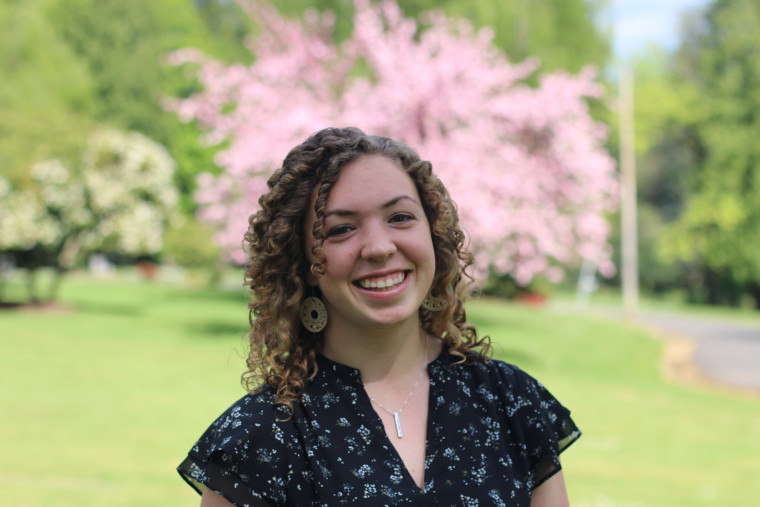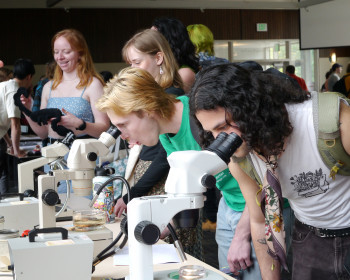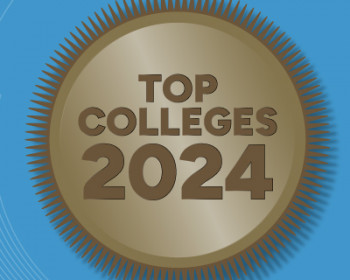Ellie Miller

Pronouns
Degree and Class Year
Hometown
Major
Extracurriculars
Overseas study
What three words would you use to describe L&C?
Congratulations on your Pickering Fellowship! We understand this award is given to outstanding students who wish to pursue a graduate degree in subjects related to the various careers offered within the U.S. Department of State. What was the application process like, and how did it feel when you got the news?
The most interesting part of the Pickering application process is the second-round interview and writing exercise. If you are selected as one of the 90 finalists after review of your initial application, you have a couple of weeks to prepare. The interview focuses on qualities they look for in a foreign service officer, such as composure, initiative, and judgment, and gives you a real-life situation to solve. We are lucky at L&C to have our own diplomat-in-residence, Niels Marquardt, who helped me practice, as did Mikah Bertelmann BA ’21, who was recently awarded a Charles B. Rangel Fellowship.
I was living in Morocco when I got the news about Pickering, so it was the middle of the night when they sent out the email. I knew which day they would notify us about final decisions, so I stayed up until midnight to hear. When I saw the subject line “Congratulations” I just thought “No way!” and I called my parents immediately. Sometimes it still doesn’t feel real!
Tell us about your upcoming research.
I’m currently applying to graduate programs, but I would like to research how U.S. security policy can serve to prevent conflict and radicalization. I’m particularly interested in the Middle East and North Africa, and I would like to explore how conditions like poverty, lack of education, or marginalization can contribute to making people more vulnerable to extremist ideology. If we have a good understanding of risk factors, we can support local partners in finding sustainable solutions.
Read more about Ellie and her fellowship.
What got you interested in U.S. foreign policy?
My parents were foreign correspondents, so I spent much of my childhood in Europe. I was exposed to international issues early on, and engaged in family conversations about the implication of American foreign policy. It wasn’t until the summer of 2018, however, that I began to think about foreign policy as a career. I taught English in rural Ladakh, India, and was struck by the stories that village elders shared about the confusion and danger they experienced as children living in a disputed border region. They would tell me about conflicts with Pakistan and their fears that climate change would ruin their water supply. I realized that I could use my privilege as an American to join the diplomatic corps of a global superpower and help shape policies that would impact these kinds of issues.
Witnessing the effects of geopolitics in such a remote corner of the world is what first drew my attention to diplomacy, then the more I learned about the Foreign Service, the more I began to think, “This is the perfect job for me!”
What advice would you give undergraduate students interested in following a pathway similar to yours?
You don’t have to follow a predetermined path or do what everyone else does. You don’t have to major in international affairs to be a good diplomat. What’s most important is that you are curious about the world around you, and you take the time to travel and live overseas so you can learn about other cultures and ways of thinking. I think it’s valuable to study a foreign language and have some volunteer experience in addition to internships. Have an adventure, never stop asking questions, and read! I believe a big part of my success in winning this fellowship and earning my State Department internship in 2019 was the fact that I had a different academic background than most of my peers, but still demonstrated a strong interest in languages and international relations.
What made you want to come to Lewis & Clark?
I was drawn to the small class size and high engagement between professors and students. As a Seattleite, I love the Pacific Northwest and I was happy to find a school with easy access to the outdoor activities that are important to me. L&C is special because, even though it is small, I still felt like I had access to a whole world of resources and knowledge. I think the strength of the school’s overseas and off-campus programs is a big part of this.
How do you describe the liberal arts?
The liberal arts education ended up being a lot more valuable than I initially expected. This model allowed me to take classes in many different fields (including two languages) while still double majoring. I could also learn about things I would have never thought about, like the history of jazz, gamelan, and Japanese tea ceremony (three of my favorite classes). A liberal arts education encourages broad curiosity, which is an important quality for people interested in diplomatic work.
How did Lewis & Clark prepare you for your graduate studies?
Lewis & Clark prepared me for my graduate studies by teaching me how to manage my time, balance my passions, and work with a rigorous academic schedule.
Now that you’ve been out of college for a while, what would you say is the most important thing you learned at Lewis & Clark?
At Lewis & Clark, I learned what I’m capable of academically. I built my research and critical-thinking skills, and became more confident in my ability to dive into new subjects I had never previously explored.
What are your career goals after graduate school?
I’m in a unique position because the Pickering fellowship includes a job in the State Department. Immediately after graduate school I will be serving my country as a diplomat and working in embassies and consulates around the world, and I plan to stay with the Foreign Service beyond my initial five-year commitment. I think it would be exciting to be an ambassador someday, but what is most important to me is having a fulfilling career regardless of what position I hold.
More Admissions Stories
Admissions is located in Frank Manor House on the Undergraduate Campus.
MSC: 32
email admissions@lclark.edu
voice 503-768-7040
fax 503-768-7055
Vice President of Admissions and Financial Aid
Eric Staab
Admissions
Lewis & Clark
615 S. Palatine Hill Road MSC 32
Portland OR 97219

